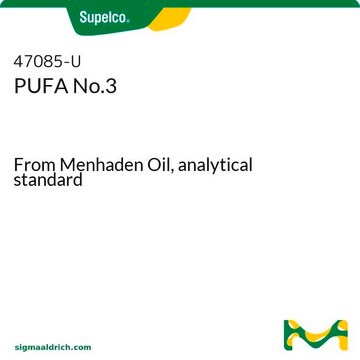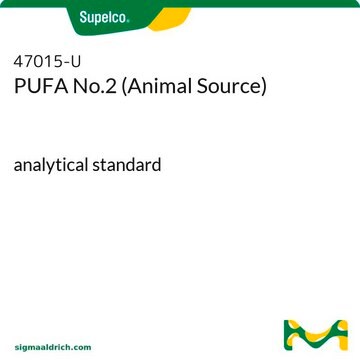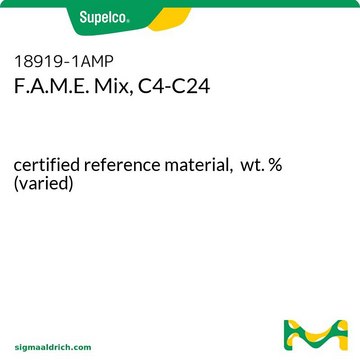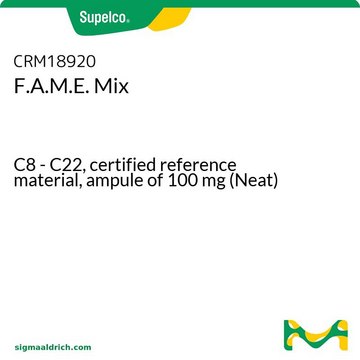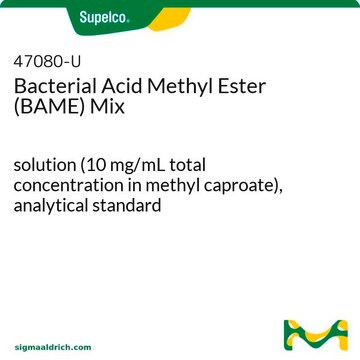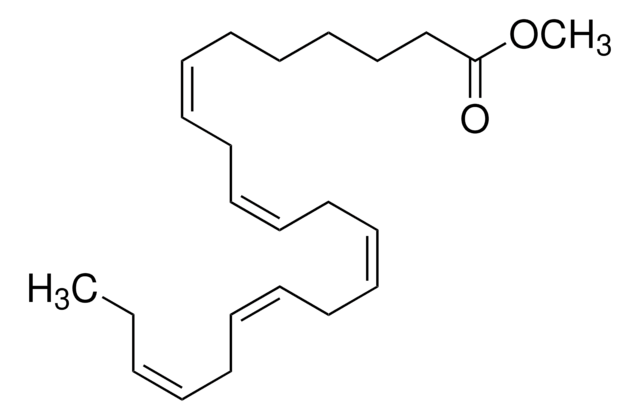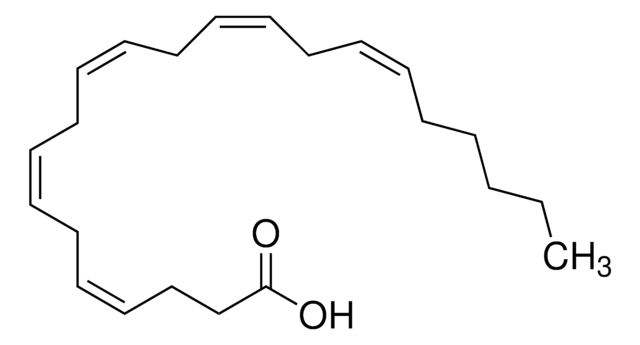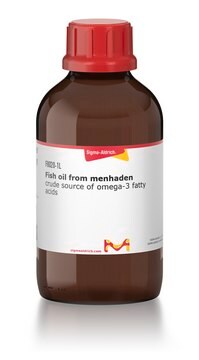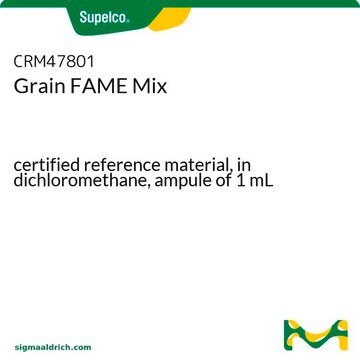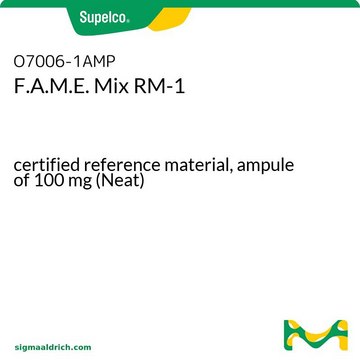47033
PUFA No.1
Marine source, analytical standard
Sinonimo/i:
Polyunsaturated Fatty Acid Mix No.1
Autenticatiper visualizzare i prezzi riservati alla tua organizzazione & contrattuali
About This Item
Codice UNSPSC:
12164500
Prodotti consigliati
Origine biologica
fish oil
Grado
analytical standard
CdA
current certificate can be downloaded
Confezionamento
pkg of 100 mg
Concentrazione
(varied concentration)
tecniche
HPLC: suitable
gas chromatography (GC): suitable
applicazioni
food and beverages
Formato
neat
Condizioni di spedizione
dry ice
Temperatura di conservazione
-10 to -25°C
Descrizione generale
PUFA No.1 is a complex qualitative standard mixture. Because it is extracted from natural materials, relative peak size and composition may vary from lot to lot.
Applicazioni
Refer to the product′s Certificate of Analysis for more information on a suitable instrument technique. Contact Technical Service for further support.
Altre note
For qualitative identification only.
Product is extracted from natural sources. The fatty acid composition varies from lot-to-lot. The fatty acids listed below may or may not be present in the current lot. A representative chromatogram is supplied with product.
Certificate of Composition is not available on-line. Please contact your local Sigma-Aldrich office for documentation.
Product is extracted from natural sources. The fatty acid composition varies from lot-to-lot. The fatty acids listed below may or may not be present in the current lot. A representative chromatogram is supplied with product.
Certificate of Composition is not available on-line. Please contact your local Sigma-Aldrich office for documentation.
Analita
Descrizione
cis-4,7,10,13,16,19-Docosahexaenoic acid methyl ester
11-Docosenoic acid methyl ester
Methyl all-cis-7,10,13,16,19-docosapentaenoate
Methyl cis-13-docosenoate
Methyl all-cis-5,8,11,14,17-eicosapentaenoate
Methyl linoleate
Methyl myristate
Methyl oleate
Methyl palmitate
Methyl palmitoleate
Methyl stearidonate
cis-11-Octadecenoic methyl ester
Methyl cis-11-eicosenoate
Vedi tutto (13)
Codice della classe di stoccaggio
10 - Combustible liquids
Classe di pericolosità dell'acqua (WGK)
WGK 1
Punto d’infiammabilità (°F)
Not applicable
Punto d’infiammabilità (°C)
Not applicable
Scegli una delle versioni più recenti:
Possiedi già questo prodotto?
I documenti relativi ai prodotti acquistati recentemente sono disponibili nell’Archivio dei documenti.
I clienti hanno visto anche
Celso Manuel Cristovão Mandume et al.
Foods (Basel, Switzerland), 8(7) (2019-06-30)
Despite being highly appreciated and consumed, the nutritional value of Chaceon maritae from Namibe (Angola) had never been studied. In the present work, edible tissues (muscle, ovaries, and hepatopancreas) of boiled female C. maritae caught off Namibe coast in two
Helena Oliveira et al.
Foods (Basel, Switzerland), 8(9) (2019-09-25)
Industrial cooking of common octopus (Octopus vulgaris) under well-established procedures is advantageous for current consumers, which demand healthy and convenient food. This work aimed to evaluate the effect of industrial water boiling, without the addition of salt, on the nutritional
José Luis Guil-Guerrero et al.
Chemistry & biodiversity, 17(12), e2000627-e2000627 (2020-10-13)
Thirty Boraginaceae species from different tribes were evaluated in a search of γ-linolenic (GLA, 18:3n-6) and stearidonic acid (SDA, 18:4n-3)-rich oils. The high GLA percentages were found in the seed oils of Symphytum bulbosum and S. tuberosum subsp. tuberosum (27.6
M J González-Fernández et al.
Biochimie, 139, 107-114 (2017-06-10)
Important health benefits have been attributed to monoacylglycerols (MAGs) due to their various physiological functions, owing to which they become candidates for use as functional foods in order to prevent the onset of certain diseases such as colon cancer. In
Laura Fernandes de Barros Marangoni et al.
Microorganisms, 7(10) (2019-10-12)
Ocean warming is one of the greatest global threats to coral reef ecosystems; it leads to the disruption of the coral-dinoflagellate symbiosis (bleaching) and to nutrient starvation, because corals mostly rely on autotrophy (i.e., the supply of photosynthates from the
Il team dei nostri ricercatori vanta grande esperienza in tutte le aree della ricerca quali Life Science, scienza dei materiali, sintesi chimica, cromatografia, discipline analitiche, ecc..
Contatta l'Assistenza Tecnica.